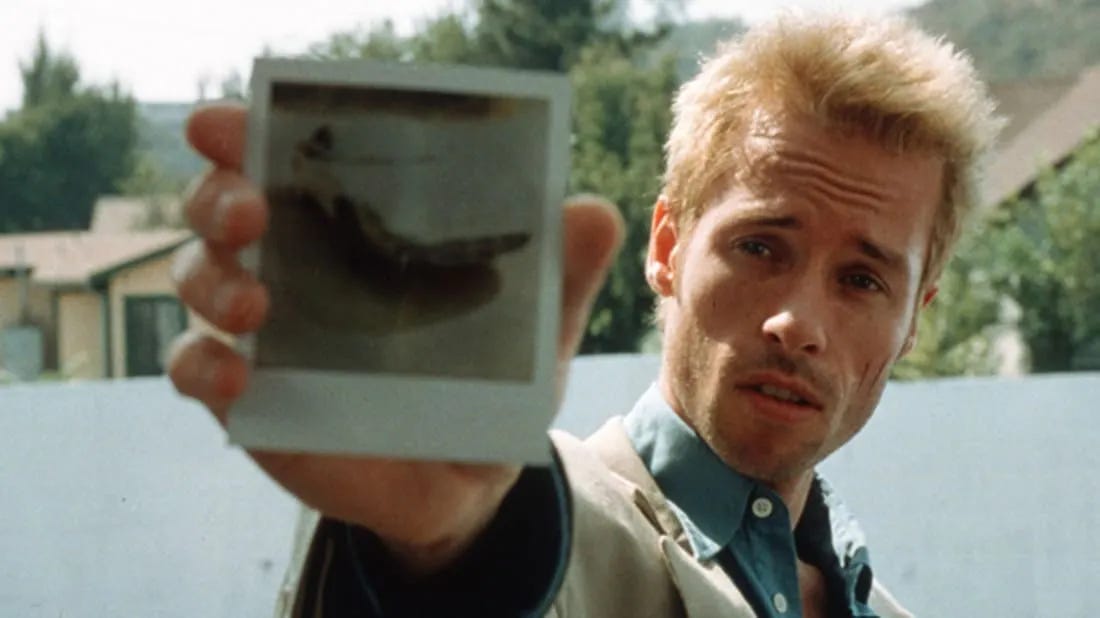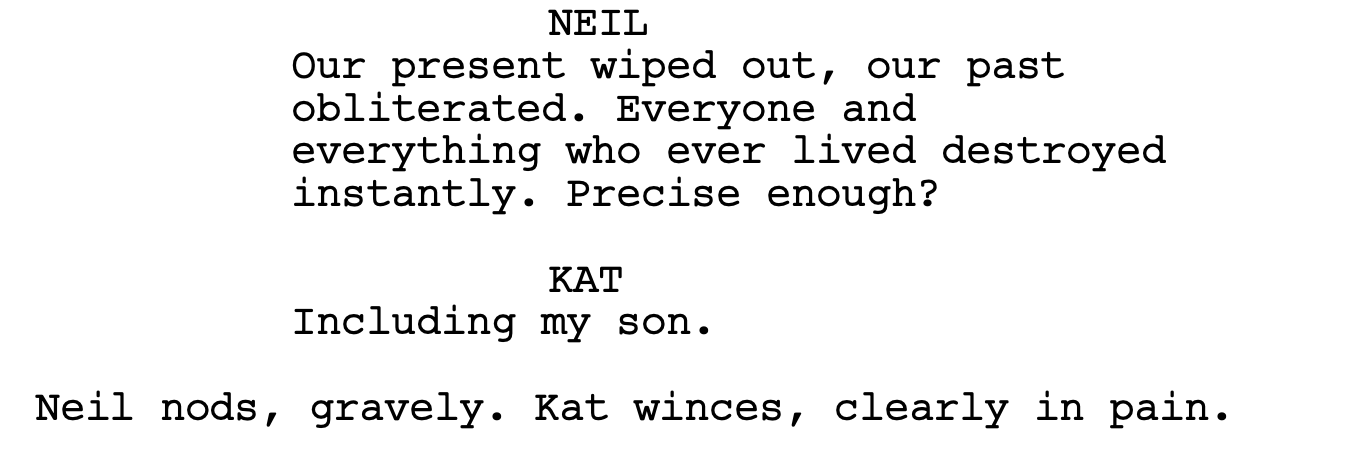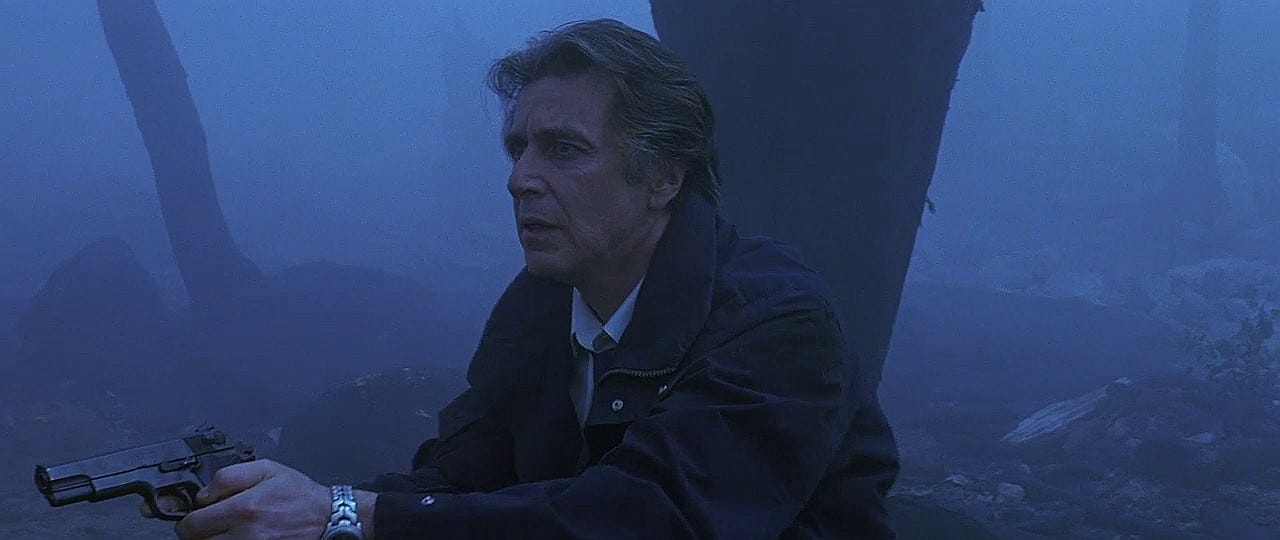Every Christopher Nolan Movie, Ranked
+ which Christopher Nolan movie is the most Christopher Nolan?
In this issue: spoilers for every Christopher Nolan movie, all of which are streaming or available for rent.
Over the course of his twelve films, Christopher Nolan has established himself as one of Hollywood’s foremost directors. Nolan is known for many stylistic quirks: his affinity for practical effects, urban architecture, booming sound, and hokey dialogue that sounds like two NPCs caught in an endless loop. But are those the trademarks most important to his oeuvre?
All of his movies are worth watching, even his amateur first film, The Following (which is good), and his most recent three hour effort, Oppenheimer (which is bad). Many have argued about what Nolan’s best movie is, but I’m not interested in that question (also, it’s Interstellar). I’m interested in what Nolan’s most Nolan-y movie is. What movie best captures Nolan’s signature style, his essence, his—pardon—stink?
I have determined nine elements key to understanding Nolan’s directorial psyche and will be making a case for the movies I think most strongly embody each category. Leave your thoughts in the comments! Onward!
Vehicular Action Sequence
To limit this category just to car chases would be a disservice. Nolan has shot elaborate sequences with ships, planes, and spacecraft—all distinguishably Nolan thanks to some impossibly enormous practical effects. Consider the truck flip in The Dark Knight’s iconic car chase. Also of note is the sublime chase scene in Tenet, which derives extra Nolaniness through time mishmashing. Though not as fast-paced, the docking scene from Interstellar is his absolute crowning moment for me, achieving not just technical beauty but a still unmatched level of emotional resonance.
Hand-to-Hand Action Scene
There’s really no contest here: it’s the hallway fight in Inception. Nolan is not a martial arts auteur. You’re never going to get a super sophisticated sequence based on just fight choreo alone; what makes his fight scenes work is how he builds and shoots a setting. This scene only gets more remarkable the more you study it, which I know because I watched it five times to write this.

Delusional Women
Maybe it’s the noir tradition of the femme fatale that Nolan is paying tribute to in his insistence on including one-to-two chronically stupid women in each movie. There are so many strong contenders for this crown that it’s easier to do the reverse and find the few Nolan women who do have a solid grasp on reality and/or their circumstances.
Most notably useless to me are Elizabeth Debicki’s languid Kat in Tenet, who never quite grasps what total world destruction means, and Rachel Dawes of Batman Begins and The Dark Knight, who was famously recast only to die pointlessly, and is indirectly responsible for the events of the trilogy because she initially triggers Bruce’s fear of bats. However, no one can quite top Mal from Inception, a woman who is literally a figment of Dom Cobb’s imagination and is MALicious (more on that later) to the point of being a borderline offensive portrayal of female instability.
…Who is Part of a Sexless Couple
The strongest bond in Nolan’s movies is usually the character’s relationship to his own psychological self-concept. The female love interest often represents a threat to that self-determination. Even when sex is depicted (I will not be discussing the sex scene in Oppenheimer, thank you for asking), it’s rare to find male-female chemistry in his work. The most notable exception to me is the definitively nonsexual relationships in Interstellar, thanks to some of the best acting in the Nolan canon and the movie’s themes of unity. Tenet is probably the strongest codifier, if only because the scene where Kat says her husband will think she’s sleeping with the Protagonist is played with grave seriousness, even though Debicki and John David Washington have about as much chemistry as a living room furniture set.
Psychological Turmoil aka Jungian Rambling
Nolan is usually associated with noir and action but psychodrama feels like the more apparent genre thread that connects his work. He’s able to physically manifest a character’s interiority with obvious clarity but without sacrificing style, whether it’s in the foggy mental and physical landscapes of Insomnia or the representation of dichotomy and disappearance in the illusions of The Prestige.
Extra credit to Jonathan Crane/Scarecrow of Batman Begins who explicitly names Carl Jung but again the top prize has to go to Inception, which literalizes the subconscious into Nolan’s other obsession: city planning.
Third Act Reveal
M. Night Shyamalan might be the poster boy of the third act twist but Nolan doesn’t get enough credit. Interstellar’s deeply humanist reveal that it’s not aliens but humans who are going to secure their future is probably my personal favorite for its emotional optimism and ultimate dad fantasy fulfillment. Still, The Prestige has to win this category because it’s a multi-part twist. The reveal unravels the exquisite duality of Christian Bale’s performance and shows the extent of the craft behind his life’s work as a magician. It also reveals that this is a universe in which magic does actually exist, and Hugh Jackman has been using it solely to piss off his ex-bestie. It is an earth-shaking revelation of not only the sci-fi bent of this world but also of the depths of male pettiness.
Overtly Significant Name
Give Nolan some credit for not naming all his heroes John and Jack like most action directors. Every original character name in the Nolanverse is imbued with Ebony Dark’ness Dementia Raven Way levels of thematic significance. “Murphy” from Interstellar is pretty unnecessary and Tenet’s “The Protagonist” mostly gets a pass for being tongue-in-cheek, but neither can compete with the names in Inception. “Ariadne” and “Mal” would be corny enough on their own, but the fact that the first letter of the main characters’ names (Dom, Robert, Eames, Arthur, Mal, Saito) spells out DREAMS really clinches it.
Single Line of Dialogue that Dramatically Summarizes the Theme of the Entire Movie
The trajectory from away message to Facebook favorite quotes section to Letterboxd review tag is an understudied phenomenon of online cringe. Nolan’s dialogue, which generally fluctuates between appropriately melodramatic and absurdly maudlin, is ideal for away messagification because of how well he breaks down a film’s big ideas into a single, endlessly memetic line. Walk down the street and you’re bound to stumble upon a Nolan line TM on a bumper sticker. It’s a surprise that it took until his eleventh movie, Tenet, to get a line that encapsulates not just the film but Nolan’s entire ethos as a filmmaker: “Don’t try to understand it, feel it.”
Male Ennui
The noir hallmark at the jelly-filled center of Nolan’s filmography. Whether it’s because of a death (of a woman) or a betrayal (of a woman), Nolan’s heroes do not so much struggle as simply live with their extreme loneliness. A strong argument can be made for any of his films to take this category. We could give it to the first of Nolan’s lonely men, The Following’s failing writer who becomes so enamored with a conman he barely notices he’s being deceived. We might consider the scale of despair and give this to Dunkirk for grappling with the emotional destruction of an entire World War. What about the Dark Knight trilogy and the boys who merely adopted the dark versus the boys who were born in it? Or Inception, where Dom can accept not knowing what’s real if it means he can be reunited with his family?
But for me, the category winner is Memento’s Leonard, played with subtle malice by Guy Pearce, a man whose fragmented memory isolates him not just from society but from himself. Nolan’s men are defined by how they engage with their own subconscious—whether it’s Dom plunging the depths of his dreams or Bruce Wayne dressing up as his greatest fear to fight crime. Leonard seems like a paradox, as we assume his inability to form memories would result in someone without any inner self. And yet Leonard is one of Nolan’s most driven leads precisely because of his amnesia. An agent of a single purpose without any way to chart his progress, he is the ultimate adrift noir hero, saddled with desires and melancholy he has no way of reckoning with, much less escaping.

Conclusion
I could tally up the results or I could simply, Tenet-like, feel them. Both methods achieve the same result: it’s Nolan’s dream heist noir, Inception, that is the most Christopher Nolan movie to ever Christopher Nolan. Inception is one of his most visually stunning but behind the sheen, it’s one of his most cynical. It’s a movie where no one really wins. The team survives and Dom gets his kids back (maybe) but everyone has almost certainly been traumatized for what—a rich guy to get richer?
Nolan’s filmography is fascinated by creation, not just where things come from but what we then do with them. Interstellar remains my favorite Nolan movie because its answer to that question is so profoundly optimistic, but Inception’s response is probably more accurate.
We create so that we can destroy. It’s a story Nolan’s told throughout his career, scaling it up in recent years to the world-ending consequences of Dunkirk and Oppenheimer. In The Prestige, Angier stumbles upon a cloning machine that could offer innumerable uses for humanity and instead uses it to destroy his rival’s life. Even when Wayne Enterprises designs something besides water vaporizers for the military and bespoke weapons for Batman, like the clean energy generator in The Dark Knight Rises, it’s stolen and converted into a bomb. But Inception still feels like the most crystalline version of this narrative, perhaps because Nolan so clearly renders the infinite architectural possibilities offered in a dream while tapping into the terror of being powerless against an intruder in your mind. We build technology that could offer new heights of interpersonal connection and instead use it to steal and extract and generate pointless wealth. It’s a story that has not yet lost its relevancy. It might never.








Mind blowing analysis. Love the structure. How did I never put together DREAMS aim my 20 viewings of Inception.
I will say this of Christopher Nolan. On first viewings I have always left feeling like I just experienced some kind of cinematic masterpiece. However, on second, third or even 20th viewings the shine starts to fade and I feel like I was duped in some way.
Retuning to Interstellar I was alarmed by how often Murphy was addressed by name (MERF). Like is that just bad writing that would have been cured in a screenwriting 101 or do I have to assume that it has some kind of greater meaning because Nolan left it in?
I think there is another category in here possibly (for your consideration). I don’t know how to label it but it’s like a Lord of the Rings kind of thing where “we’ll never make it. There’s thousands of them and only nine of us.” CUT TO “we made it.” Or using unorthodox methods to achieve an impossible task. Which is the entire McConaughey character’s purpose in Interstellar.
Tenet was the only movie I’ve watched and then IMMEDIATELY watched again. I just found it infinitely intriguing. I would agree Inception is just visually stunning and I’ve always been a big dreamer and found the premise of entering another person’s dream to be even more interesting then lucid dreaming. Interstellar initially wasn’t a favourite but on watching it again I found more to love especially the idea that we’re our own saviours.